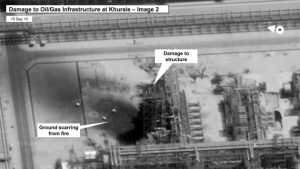2 Big Effects of Drone Attack on International Shipping

U.S. government released satellite image drone attack on saudi arabian oil facility
In case you missed the big news this weekend, a drone attack hit two oil facilities in Saudi Arabia on Saturday (September 14th, 2019). Here’s a brief summary from an Aljazeera news article:
The pre-dawn attacks on Saturday knocked out more than half of crude output from the world’s top exporter – five percent of the global oil supply – and cut output by 5.7 million barrels per day.
You may be thinking, “What does an attack in Saudi Arabia have to do with me?” A lot, actually. Beyond the large geopolitical fallouts from these drone attacks, U.S. shippers could be significantly impacted when it comes to importing and exporting goods.
Here are two significant impacts the drone attacks on Saudi Arabia oil facilities could have on American shippers.
1. Exasperated IMO 2020 Fuel Hikes
Perhaps 5% doesn’t sound like a huge number. However, 5% of the world’s oil supply being taken out is very significant when it comes to fuel prices. And this couldn’t come at a worse time as the international shipping industry is preparing for IMO 2020, when cleaner, more expensive fuel is needed for container ships to meet the International Maritime Organization’s (IMO) 5% carbon emission limit on fuel, which goes into effect on January 1st of the upcoming year.
Fuel prices, not surprisingly, have already spiked as a result of the drone attacks. Plus, it just so happens that the oil facilities hit are ones that were helping to produce the cleaner fuel needed for IMO 2020.
Greg Miller reported in an American Shipper article:
Price-reporting company Argus confirmed on Sept. 16 that Singapore marine fuel (bunker) prices were up “sharply.” It cited increases of 8-12% from Sept. 13.
…
According to Amit Mehrotra, transportation analyst at Deutsche Bank, “The attack will primarily impact Saudi’s production of lighter crude grades, Arab Extra Light and Arab Light. These light crude grades generally produce more mid-distillates at the expense of residual output and thus are seeing increased demand on the back of IMO 2020 sulfur fuel regulations.
“For this reason, lost production of light crude oil could make it more difficult for the global refining industry to meet the IMO 2020 demand shift while also driving a widening of fuel price spreads,” said Mehrotra, referring to the spread between low-sulfur compliant fuels and the heavy fuel oil to be used by ships with scrubbers.
This fuel bunker price increase is certainly not a problem unique to U.S. shippers. Reduced oil production and spiking prices during the IMO 2020 transition means higher costs for the entire international shipping industry. Of course, U.S. shippers are in no way immune.
2. Expedited U.S. – China Trade Deal
The trade war between the U.S. and China just seems to escalate and escalate with more and more tariff hikes and trade negotiations that show no indications of a trade deal happening soon.
The drone attacks actually might help resolve the US-China trade war with a trade deal happening sooner than its previous trajectory indicated. Upon hearing the news, my mind immediately went to the impact this attack would have on fuel prices as we’re heading for IMO 2020, but a positive impact of expediting a U.S.-China trade deal never occurred to me until I read Miller’s American Shipper article.
Miller talks about the U.S. government’s allegations that Iran was involved in the attacks as part of an Iranian strategy to threaten regional oil infrastructure in retaliation to U.S. sanctions. He then brings up how China continues to buy Iranian oil and how that’s an important talking point in upcoming trade negotiations. Then Miller adds this interesting nugget:
Furthermore, the vulnerability of Saudi infrastructure might make China more amenable to a trade deal with the U.S., because U.S. crude has just become more attractive to Chinese buyers.
China’s purchasing of U.S. oil has fallen during the trade war, but the country may need to increase its buying of U.S. crude in order to replace what it has been purchasing from Saudi Arabia.
Miller gives some good data point on this in his article:
According to data from the Energy Information Administration (EIA), China was buying over 100,000 barrels per day (b/d) of U.S. crude in late 2018, but volumes fell sharply during the first half of this year as trade tensions increased, and China instituted a 5% tariff on U.S. crude last month. China is importing around 1.8 million barrels per day (b/d) of crude from Saudi Arabia, accounting for a quarter of Saudi Arabia’s 7.3 million b/d in (pre-attack) crude exports.
Miller makes a good point when he writes, “If it is in China’s interests to buy U.S. crude as an alternative to Middle East crude due to geopolitical unrest threatening its main supplier in that region, it could create an additional incentive to get a trade deal done…”
Obviously, a trade deal getting done between the U.S. and China would be great news for U.S. shippers who import or export from or to China. However, there is another possible outcome I could see.
What if China decided to up its crude purchasing from Iran to replace Saudi Arabia as its top oil supplier? This would increase tensions between China and the U.S., seriously hindering the completion of a trade deal.
Hopefully, the economic importance of trade between China and the U.S. plus political backlash from purchasing more oil from Iran if America’s evidence of Iran being responsible for the attacks is compelling would push China toward U.S. crude over Iranian crude, resulting in an expedited trade deal rather than increased tensions.
Conclusion
Obviously, the geopolitical implications of the drone attacks on Saudi Arabia’s oil facilities go way beyond its effects on international shipping.
With the U.S. indicating the attacks came from Iran and gathering evidence to present at the UN General Assembly, President Trump is going to have to decide how to respond.
Many would deem a military response appropriate. However, it’s hard to imagine Trump making a move like targeting Iranian oil facilities with a missile strike resulting in anything other than escalation. Getting the U.S. involved in another Middle-Eastern war would likely be a highly unpopular thing, which might give a president heading into an election year pause. Of course, doing nothing would show weakness, and likely also hurt Trump in the 2020 election.
Hopefully, the president will make the correct decision, regardless of its re-election implications. However, I wouldn’t want to be the one who had to decide what the right thing to do is.
While we here at Universal Cargo have to keep an eye on how events around the world are affecting international shipping, everyone should keep an eye on this situation, as such an act of aggression could lead to farther reaching conflict and war.




